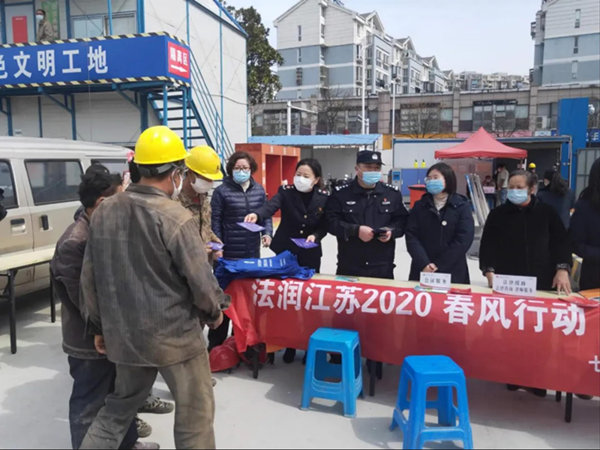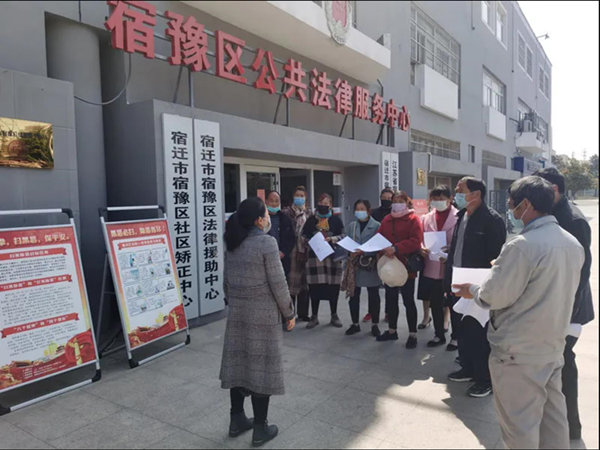Jiangsu steps up efforts to ensure migrant workers’ rights
While continuing its daily epidemic prevention work, the judicial department of East China's Jiangsu province has taken steps to protect migrant workers' legal rights and interests, ensuring the effective implementation of its newly-issued rule for safeguarding wage payment of these workers.
Law publicity effort
To pave the way for the rule's rollout across the province, the department joined hands with the province's human resources authority to launch a week-long law publicity campaign, during which officials answered wage payment-related questions from both enterprises and migrant workers through an online live program organized by the provincial government.
It also produces online training videos and releases typical cases in an effort to raise workers' legal awareness.

Staff from Jiangsu' judicial department carry out a law publicity activity at a construction site. [Photo/moj.gov.cn]
Strengthening legal aid
Judicial authorities across the province have ramped up efforts to strengthen their legal aid services as more and more enterprises resume operation.
Considering the social-distancing requirement during the epidemic prevention period, authorities have shifted to online platforms such as WeChat and teleconferencing systems to provide their services.
By adopting the notification and commitment practice, authorities have made it much easier for migrant workers to receive legal aid, greatly reducing time needed for application review and lawyer designation.
They also prioritize mediation in providing legal aid so as to solve applicants' problems in a more efficient and flexible way.

An officer at the legal aid center of the city of Suqian talks with applicants. [Photo/moj.gov.cn]
Building a cooperation mechanism
A majority of judicial authorities in Jiangsu have cooperated with local procuratorates to further enhance the protection of migrant workers' rights and interests. In the city of Taizhou, for example, a guideline on providing legal and litigation support for migrant workers was jointly enacted by the local judicial bureau and procuratorate.
Similar cooperation mechanisms have also been established among judicial, labor supervision and labor arbitration agencies aimed at helping migrant workers get their wages through non-litigation ways.
Enhancing dispute early-warning system
The province has been drawing on its legal aid information management platform to conduct real-time monitoring of labor disputes and analyze the data on a monthly basis.
Meanwhile, via a three-tier database, local human resources, housing and urban-rural development as well as development and reform agencies are able to freely share such information as labor relations and wage payments.
The legal aid center of the city of Taizhou, for instance, has taken advantage of a real-name information management platform for construction workers to offer them legal aid without preconditions such as household registration and financial strength.

Ministry of Justice of the
People's Republic of China
All rights reserved. Presented by China Daily.
京ICP备13016994号-2


